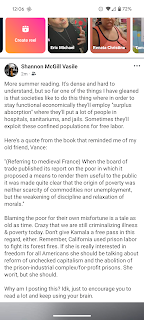Friday, November 8, 2024
Wednesday, November 6, 2024
Wednesday, August 28, 2024
"What do you think happens when we die?" It's a useless question. It's like trying to divide a number by zero. Despite the insistence of any given cult leader, nobody really knows the answer. Add to that the fact that whatever exists in/as the beyond is likely incomprehensible to the marginally upgraded primate brains we carry around in our skulls. Still, we can't shrink from the inevitability of death. It's not just impossible to avoid, it's actually the central mystery of our lives--like a dense, impenetrable hub of the wheel that keeps us in motion, keeps us vital.
Even our peripheral sense of what death is, or might be, gives our lives a specific shape. Our terror forces us to devise a causa sui project, or hero project, (I learned this from Ernest Becker) where in essence we say, "Ok, if I can be a good enough parent/artist/teacher/worker/rich enough, etc. etc. then my life will last forever. I can cheat my own dissolution by making my life so meaningful that I will never be forgotten." Becker explains that human beings are unique in the animal kingdom because they are creative, innovative, self-conscious, and aware of a bigger picture. Ergo, they alone are the unfortunate recipients of a crushing neurosis and suffering that stems from having to reconcile those God-like qualities with the uncomfortable truth that they ultimately end up as food for worms. (In his discussion of anality, Becker says that human beings are reminded of this central conflict every time they shit. Angels who shit, he calls us, though more elegantly than that.) Unless we can believe whole-heartedly in our hero projects or bury our heads in the sand, we are eventually driven mad by our dual-nature, hence the need for psychoanalysis.
So back to "What do you think happens when we die?" the question that is the source of so much anxiety. It's impossible to answer and so here is my alternative: "What do you HOPE happens when we die?"
This shift makes it possible to step away from a need to be right or wrong or reasonable and gives you the freedom to engage with death in an imaginative way. Hope has no boundaries. It doesn't have to account for the Pope or Richard Dawkins. You can make your afterlife the fulfillment of your deepest, dearest desires.
For me, I will be greeted enthusiastically by people who know and love me. My body will feel buoyant and strong, without pain. I will be surrounded by flowers, waterfalls, a luminous city. We will sing, dance, feast, and laugh. Our favorite dogs and cats will be there. I will finally understand the answers to all the puzzles that confounded me when I was alive and I'll be able to see how it all fits together. After some time of celebration and rest, the boss will come and say, "Do you want to go back? What do you want to experience this time? Do you want to be a worm or a bear or a mother or father or what?" And that's when I'll say, "Put me back in New Jersey and let me be a singer and a teacher one more time."
My theory is that if we strengthen this part of our brains--if we practice thinking of death in a positive, playful way, we may be able to save ourselves so much mental turmoil. If we develop this habit of creative visualization around death, when the time comes, instead of being sad and scared, we will expect an adventure. We will be primed for the dream to come true.

